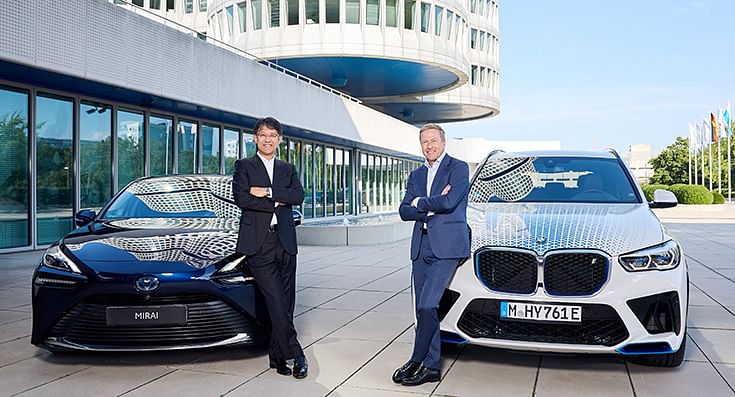Toyota and BMW join forces to develop next-gen fuel cell system
Toyota Motor Corporation and BMW Group strengthen collaboration on progress towards a hydrogen society; aim to expand the line-up of fuel cell passenger cars and also jointly develop third- generation fuel cell system; BMW to launch first-ever series production fuel cell vehicle in 2028.
Toyota Motor Corporation (Toyota) and the BMW Group (BMW) have signed an agreement to strengthen collaboration in the hydrogen sector, with a view to creating a hydrogen society and achieving overall carbon neutrality. The companies will work together on the development of fuel cell systems and the improvement of infrastructure.
The companies signed an agreement in December 2011 to establish a mid-to-long-term cooperative relationship in environmental technology. They have jointly advanced the development of environmental technologies, including fuel cells and sports cars, for more than a decade. Sharing a vision of ‘realising a hydrogen society’, they will continue to accelerate technological innovation in fuel cell systems.
Toyota and BMW are cooperating on development of a third-generation fuel cell system which will be installed in both companies’ models, offering customers a broad range of fuel cell electric vehicles (FCEVs). As a first step, BMW plans to launch its first mass-produced FCEV in 2028.
Both companies will also work to create synergies through collaboration in development and procurement, as well as drive down costs by amalgamating powertrain units to expand commercial and passenger vehicle demand. By making FCEVs more accessible, the partnership will contribute to the creation of a hydrogen society.
 Koji Sato, President and Member of the Board of Management (Representative Director) Toyota Motor Corporation and Oliver Zipse, Chairman of the Board of Management of BMW AG.
Koji Sato, President and Member of the Board of Management (Representative Director) Toyota Motor Corporation and Oliver Zipse, Chairman of the Board of Management of BMW AG.
Establishing sustainable hydrogen supply networks
Both Toyota and the BMW Group believe that working with like-minded partners is essential for the realisation of a hydrogen society. Given the need to create clusters of demand for hydrogen in the early stages of popularisation, Toyota and BMW will encourage sustainable hydrogen supply by creating demand and working closely with hydrogen-producing companies, as well as distribution and refuelling facilities, to ensure a stable hydrogen supply and reduce costs.
Koji Sato, president, Toyota, said: “We are pleased the collaboration between BMW and Toyota has entered a new stage. In our long history of partnership, we have confirmed that BMW and Toyota share the same passion for cars and belief in ‘technology openness’ and a ‘multi-pathway’ approach to carbon neutrality. Based on these shared values, we will deepen our collaboration in efforts such as the joint development of next generation fuel cell systems and the expansion of infrastructure, aiming for the realisation of a hydrogen society. We will accelerate our efforts together with BMW and partners across various industries to realise a future where hydrogen energy supports society.”
Oliver Zipse, Chairman of the Board of Management, BMW AG, commented: “This is a milestone in automotive history: the first ever series production fuel cell vehicle to be offered by a global premium manufacturer. Powered by hydrogen and driven by the spirit of our cooperation, it will underscore how technological progress is shaping future mobility. And it will herald an era of significant demand for fuel cell vehicles.”
Benefits of hydrogen-powered technology
Hydrogen is recognized as a promising future energy carrier for global decarbonization. It acts as an effective storage medium for renewable energy sources, helping to balance supply and demand and enabling a more stable and reliable integration of renewables into the energy grid. According to the two automakers, hydrogen is the missing piece for completing the electric mobility puzzle where battery electric drive systems are not an optimal solution.
Toyota has positioned hydrogen as a key energy source in its efforts to achieve carbon neutrality and has been advancing initiatives in collaboration with many partners across the areas of hydrogen production, transportation, storage and usage.
Toyota aims to be ‘best-in-town’ by conducting locally rooted management that caters to each region’s market characteristics and customer needs. Moving forward, the Japanese carmaker states that it “will continue to address the needs of customers in each region by focusing on a multi-pathway approach that includes FCEVs, battery electric vehicles (BEVs), hybrid electric vehicles (HEVs) and plug-in hybrid electric vehicles (PHEVs), all while working steadily towards reducing CO2 emissions.”
RELATED ARTICLES
Autoliv Plans JV for Advanced Safety Electronics With China’s HSAE
The new joint venture, which is to be located strategically near Shanghai and close to several existing Autoliv sites in...
JLR to Restart Production Over a Month After September Hacking
Manufacturing operations at the Tata Group-owned British luxury car and SUV manufacturer were shut down following a cybe...
BYD UK Sales Jump 880% in September to 11,271 units
Sales record sets the UK apart as the largest international market for BYD outside of China for the first time. The Seal...






 By Autocar Professional Bureau
By Autocar Professional Bureau
 06 Sep 2024
06 Sep 2024
 3814 Views
3814 Views





 Ajit Dalvi
Ajit Dalvi




